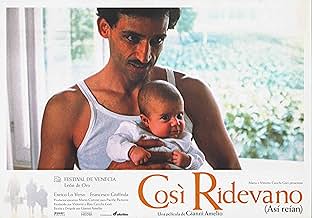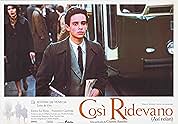Just released on DVD, Gianni Amelio's 1998 film The Way We Laughed is a heartfelt chronicle of the fortunes of two brothers over a six-year period in postwar Italy that parallels the growth of the country from an agricultural to an urbanized, industrial society. Winner of the Grand Lion Award at the Venice Film Festival, the film derives its title from its constant reference to old-fashioned jokes on the back page of an Italian magazine from the fifties. Though I do not feel it is quite on the same level as Amelio's earlier work (L'America, Stolen Children), The Way We Laughed is a soulful and captivating film that evokes a world little remembered except in the great Italian neo-realism films from the 40s and 50s. But the film is far from being a historical or political drama. As Sokurov explored the complex relationships between mothers and fathers and their sons in his Russian films, Amelio investigates the bond between brothers and the issues that result from self-sacrifice in a close-knit Italian family.
The film is separated into six parts labeled "Arrivals," "Deceptions," "Money," "Letters," "Blood" and "Families", each taking place on one day during the period from 1958 to 1964. While this technique allows us to understand the events taking place in Italy during this period, the sudden changes in the lives of the characters is difficult to follow and we are left having to put the pieces of the puzzle together on our own. As the film opens, Giovanni (Enrico Lo Verso), a poor illiterate worker arrives from Sicily to visit his teenage brother Pietro (Francesco Giuffrida) in the industrial north of Italy who is studying to become a teacher. Determined that his brother Pietro will get a good education, he decides to remain in Turin to support him.
It is clear from the outset that all is not well with Pietro. He hides behind a pillar at the train station rather than meeting his brother, then goes out of way to help a Sicilan family who are lost until he finally gives up in disgust. He is very handsome but there is a haunted look in his eyes and it is never clear what his secrets are. Giovanni, magnificently portrayed by Lo Verso, is quite different. He is a giving person -- open and warm hearted. He sacrifices for Pietro, working low paying menial jobs but the younger brother seems unmotivated and does not take studying very seriously. Their love is not at issue, but each has an idealized picture of the other and they never fully come to grips with each other's reality.
As the years go by, Giovanni begins to move up the economic ladder and becomes a low-level Supervisor, then the boss of a cooperative. Pietro meanwhile has gone to a private teacher and has received his degree. The brothers remain close but when Pietro witnesses Giovanni getting into a fight with a presumed underworld figure, the consequences that result from self-sacrifice and the betrayal of morality are explored in a powerful conclusion. Like Giovanni's rise to a position of power through suggested shady dealings, The Way We Laughed seems to be saying that as modern Western societies have become rich, they have arrogantly forgotten the values it took them to get there.










